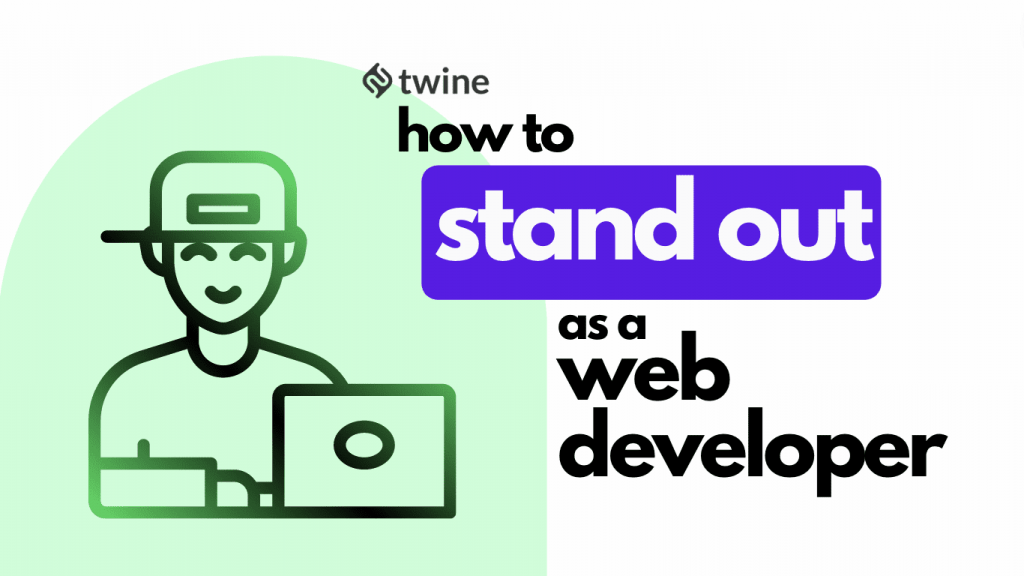For more Hardware & Accessories, check out the Freelancer Toolkit…

If you are a freelance web developer in 2023, congratulations!
Web developers are among the most sought-after professionals in the U.S. today. According to the Bureau of Labor Statistics, web development job openings are projected to grow by 23 percent by 2031.
That means it is a great time to harness all this demand, maximize your earnings, and call your own shots by becoming a freelance web developer.
Read below to learn how you can stand out as a freelance web developer and land those big clients.
Be recognized as an expert in Web Development. Join Twine.
10 Ways To Become a Distinguished Freelance Web Developer
1. Nail Basic Web Development Skills

Depending on how you choose to spend your time at work, you have the option to work as a freelance web developer on a variety of projects for national or international clients. Your job can include writing code to meet requirements while also looking good and working well.
Consider what you already know and where you want to go as a web developer if you are just starting out or changing careers. Invest in education and training to strengthen your web development basics. Back-end, front-end, and full-stack web developers are the three types of web developers.
Back-end web developers are in charge of building a website’s structure. This may include developing the website core, managing the database, and other server-related responsibilities.
If this is your niche, refine your skills in writing code and test units. You have to be efficient in Hypertext Preprocessor (PHP), Structured Query Language (MySQL), Python, and other programming languages.
Front-end developers work on the website’s user interface layer to ensure a website’s appearance and functionalities match the client’s expectations.
As a freelance front-end developer, your primary focus will be translating UI mock-ups and requirements from your clients into a functional website. You must have a good grasp of programming languages like HTML, CSS, JavaScript, and others.
Do you want to focus on full-stack development? You must have both front-end (client side) and back-end (server side) skills since you will work on both.
2. Build Up Your Work Experience

The more experience, credentials, and testimonials you have, the more likely it is that you will land your next paying job.
Getting your first job in web development is the most difficult part if you have no prior expertise. Becoming a freelance web developer consistently ranks as one of the best business ideas to pursue on most lists. It’s worth the effort to build up your work experience so you can call your own shots later.
To build your developer resume, you might want to talk to potential clients and offer your services for free for a limited time. Try entry-level positions and internships. The references and experience will pay off in the long run.
However, you don’t always have to contact strangers to get hired:
- Start with your peers and use your connections to start your freelance web developer journey.
- Reach out to previous employers and see if they will hire you as a freelancer.
- Chat with friends and acquaintances to explore opportunities to help you build up work experience. You can also ask them to refer you to people they know.
3. Create a Portfolio
Creating a website or a portfolio will help you gain your potential clients’ trust. Displaying your work experience with solid examples is the best way to prove your skills as a web developer.
Here are some things you can include in your portfolio:
Your Work or Samples
Display your work to your target audience. Show potential employers a list of the web development projects you have worked on to show off your skills. Make sure you have permission from previous employers to share information.
If you can, show working prototypes or finished products. Get detailed and technical to spell out how complex the projects were.
Selected Projects
Include less than 8 to 10 selected projects in your portfolio. This way, your potential customers won’t feel overwhelmed when browsing your page.
If you are just starting out, include lots of details about the few projects you have worked on. You can also create demos to illustrate your ideas, even if these aren’t paid projects.
Arrange your projects in a timeline view to show a progression of responsibilities, complexity, and skill.
Showcase Your Passions and Expertise
Part of being a freelancer is pursuing the opportunities you enjoy working on. Include the type of work you want to do in the future. Your target customers will know if you’re suitable to work with them.
If you want to specialize in a particular industry, spell that out. For example, display your advertising industry-related work and ideas if you want to work in the field. If you concentrate on tech-related work, show that in your portfolio.
Focusing on one niche has benefits because people will see that you have the necessary skill or a clear direction for your web development path. On the other hand, if you are low on experience, showcase your versatility with a range of samples.
You can check out these web developers’ websites for inspiration:
4. Build Your Online Presence
Building your online presence is vital in getting customers as a freelance web developer.
Personal Website
Create a personal website to showcase your portfolio, contact information, references, and rates. This is where search results and your social profiles should direct your customers.
Social Networking Sites
Social networking sites are a great way to connect with your target customers, as they let you share your work and connect with a broader audience. You can also use it to bring traffic to your website.
LinkedIn is one of the most important professional networking sites, so make sure to create a profile and showcase your work experience. This platform will allow you to keep in touch with previous clients and connect with like-minded people.
Freelancer Websites
Finally, list your services on a freelance platform like Twine.
Using sites like Twine, where there are thousands of possible clients looking for web development services, can keep your work pipeline full.
5. Actively Connect With People
You can start networking with other web developers to learn new things, meet new people, and share your work. For example, you can try participating in coding boot camps or hackathons.
You can also attend seminars, conventions, or webinars hosted by more experienced web developers. It can help you make a better impression in the business and go beyond what you learned in web development classes. You might even find potential clients at these events…
6. Join Forums and Groups
Enter forums and groups for web developers so you can have a place to discuss anything related to your niche. Here, you can seek help, get feedback, and stay aware of the latest trends related to web development. You may also find a way to advance your career through referrals.
Some groups where you can find like-minded developers are Devtalk, StackOverflow, CoffeeCup Software, Webdeveloper.com Forum, and Web Designer Forum.
You can also answer questions on Quora, Facebook, and Reddit forums. Even if the person who asked the query isn’t looking to hire a web developer, it will position you as an expert in the field.
7. Continue to Hone Your Skills
Whichever web development career path you choose, you must keep your skills current and relevant to stand out. Development languages, best practices, tools, and technologies change fast.
Ask for feedback from past clients and previous co-workers to find gaps in your skillset. Talk to other web developers and read industry news to determine emerging trends. Finally, browse job postings to find out which skills are in demand.
Whether you’re a beginner or an expert in web development, there’s always something new to learn. Keep yourself ahead of the curve and stand out to employers.
8. Look at What Others Are Not Doing
There are numerous freelance web developers available online. Consider these things to develop a unique service for your potential clients:
- What jobs do your customers often ask you to do?
- Can you develop a complex skill that others may not be able to take on?
- Are there new technologies or techniques that can set you apart?
If you’re willing to learn an extra skill and take on challenging projects, you can carve out a niche for yourself.
9. Start a Web Development Blog
Blogging probably isn’t something you’ve thought of doing as a web developer. However, it’s a great way to position yourself as an expert in your field.
You can answer common questions or dive deep into the web-developing niche to share your expertise. For instance, you can pick a specific programming language and focus on writing detailed posts about it.
Let’s say you choose React, a JavaScript library that helps developers build user interfaces (UIs). Start by writing detailed articles to help new developers understand React. Focus on problem-solving and providing your unique perspective.
Once you’ve worked on a few blog posts about React, you can start including a link to your blog in your job applications, portfolio, and social media sites.
Besides potential employers, other web developers may appreciate your work or reach out with questions. Any opportunity to expand your network is a plus as a freelance web developer.
10. Create a Professional Brand
Lastly, focus on creating a consistent, professional brand. It is an essential part of marketing yourself. Branding is about shaping your identity as an individual or a business.
Present yourself professionally in your online accounts. A simple profile picture that looks professional can give you a trustworthy look on Facebook, LinkedIn, and Twitter. Keep your usernames, graphics, logos, and colors consistent across all channels.
Most importantly, consistently exceed clients’ expectations and ask for reviews. Combined with positioning yourself as an expert through your blog, your brand will come to be known as reliable and trustworthy.
Work Your Way Up as a Web Developer
It can be challenging for a freelance web developer to stand out from the competition; however, you can improve your chances by learning the right tools and investing in updating your skills.
Create a polished online presence with a professional portfolio, highlight your experience and share your expertise. Finally, focus on consistently growing your network and references.
These tips can help you achieve your goals and become a well-known freelance web developer.
Ready to get hired? At Twine, we have dozens of top-quality jobs being posted each and every day. There is a job waiting for your skills in everything from design to marketing, development to copywriting. Join the marketplace of diverse creative talent here.



